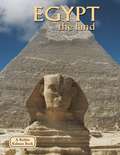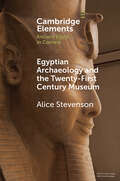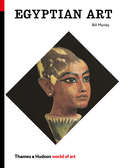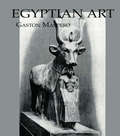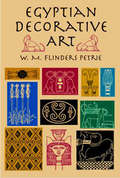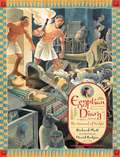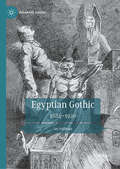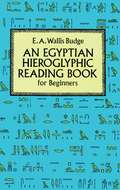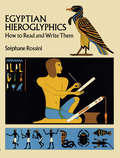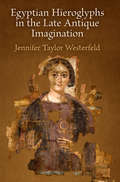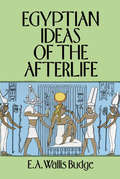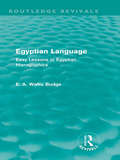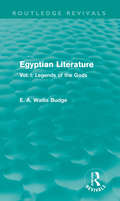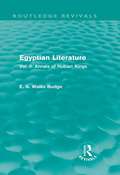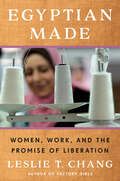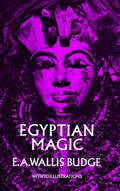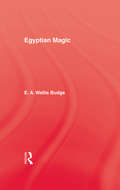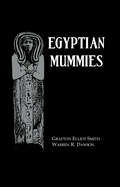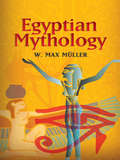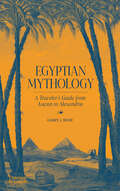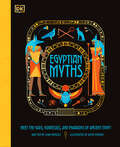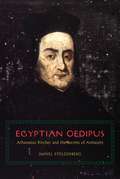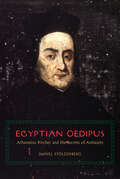- Table View
- List View
Egypt: The Land (Lands, People and Cultures)
by Arlene MoscovitchEgypt is a land of timeless monuments and artifacts. It is also a land marked by the changes brought by the modern world; where camel drivers talk on cell phones and ancient tombs are moved to make way for modern dam building projects. With photographs, this work addresses the problems of pollution, global warming, and erosion on the land.
Egyptian Archaeology and the Twenty-First Century Museum (Elements in Ancient Egypt in Context)
by Alice StevensonThis Element addresses the cultural production of ancient Egypt in the museum as a mixture of multiple pasts and presents that cohere around collections; their artefacts, documentation, storage, research, and display. Its four sections examine how ideas about the past are formed by museum assemblages: how their histories of acquisition and documentation shape interpretation, the range of materials that comprise them, the influence of their geographical framing, and the moments of remaking that might be possible. Throughout, the importance of critical approaches to interpretation is underscored, reasserting the museum as a site of active research and experiment, rather than only exhibitionary product or communicative media. It argues for a multi-directional approach to museum work that seeks to reveal the inter-relations of collection histories and which has implications not just for museum representation and documentation, but also for archaeological practice more broadly.
Egyptian Art (World of Art #0)
by Bill ManleyAn insightful volume delving into the enduringly compelling art of ancient Egypt, from a new historical perspective The art and architecture of Egypt during the age of the pharaohs continue to capture the imagination of the modern world. Among the great creative achievements of ancient Egypt are a set of constant forms: archetypes in art and architecture in which the origins of concepts such as authority, divinity, beauty, and meaning are readily discernible. Whether adapted to fine, delicate jewelry or colossal statues, these forms maintain a human face—with human ideas and emotions. These artistic templates, and the ideas they articulated, were refined and reinvented through dozens of centuries, until scenes first created for the earliest kings, around 3000 BCE, were eventually used to represent Roman emperors and the last officials of pre-Christian Egypt. Bill Manley’s account of the art of ancient Egypt draws on the finest works through more than 3,000 years and places celebrated masterpieces, from the Narmer palette to Tutankhamun’s gold mask, in their original contexts in the tombs, temples, and palaces of the pharaohs and their citizens.
Egyptian Art: Studies
by MasperoFirst published in 2005. Gaston Maspero, the leading expert on Egyptian art, writes here with authority and style on a very significant aspect of ancient Egypt. By compiling and publishing this volume, he sought to familiarise the general public with some of the finest examples of ancient Egyptian art, and to enhance their appreciation of these treasures. Many of the pieces described herein were examined by the author in museums around the world. Others he caught as they emerged from the ground, moments after their discovery.
Egyptian Decorative Art
by W. M. PetrieClassic examination of the historical development of Egyptian decorative art, including the writing of hieroglyphs and the origin of patterns. Over 200 carefully drawn figures illustrate spirals, feathers, rosettes, lotus blossoms, basket work, cornices, gods and goddeses, scarabs, and more. Invaluable to students of fine art, art history, and the decorative arts.
Egyptian Diary: The Journal of Nakht
by Richard PlattWho is plundering the tombs of ancient Memphis? A brother and sister solve the mystery in this diary full of intriguing details about daily life in Egypt 3,500 years ago. What was it like to be an aspiring young scribe in Egypt, circa 1500 BC? Picture it through the eyes of nine-year-old Nakht, who has just moved with his family to bustling Memphis, where his father has a prestigious new job. As Nakht takes up his own (often boring) lessons, little does he know that he and his sister, Tamyt, will soon stumble upon a sinister plot involving the robbing of nearby tombs -- and will actually catch the high-ranking mastermind at a banquet inside their own house! As a reward, the siblings are invited to the royal palace in Thebes to meet none other than King Hatshepsut, whom they are shocked to discover is a woman -- one of few female kings in ancient Egyptian history. Brimming with lively, detailed illustrations and bolstered with endnotes, a timeline, and a glossary, this newest tale from the author of CASTLE DIARY and PIRATE DIARY is sure to stir readers' interest in one of the most fascinating eras in history.
Egyptian Gothic: 1884–1920 (Palgrave Gothic)
by Jay SullivanThe Egyptian Gothic consists of novels and short stories about ancient Egyptian mummies returning to life to seek retribution or romance as well as cursed object tales. Now mostly forgotten, from the 1880s through to the 1920s it was more popular than the vampire genre. This book is the first to examine the genre by using the frequent sensory descriptions within these texts to interrogate attitudes towards Empire. Its aims are twofold. Firstly, it demonstrates that despite their status as disposable popular fiction these texts are rich in sensory discourses that have thus far been unexamined. Secondly, reading these discourses of touch, sight, smell, sound and taste reveals new and intriguing ways in which Egypt is allowed to strike back against the British Empire. The book argues that the Egyptian Gothic does not support the domination of Empire, but instead presents a power dynamic in flux with the mummy fighting back against Western occupation. Egypt and its artefacts evoke simultaneous feelings of fear and desire, where those who meddle by invading tombs or stealing mummies are destroyed by Egyptian revenants.
Egyptian Hieroglyphic Grammar: A Handbook for Beginners
by Gunther RoederWritten and spoken for about 4,000 years, Egyptian is no longer a living language (Arabic is the major language of modern Egypt); however, ancient Egyptian is still studied by Egyptologists, historians, archaeologists, and students interested in the age-old civilization along the Nile.Typically, students of ancient Egyptian begin with Middle, or Classical, Egyptian, which was written in hieroglyphic script. Middle Egyptian is especially important because it is the language in which many important literary works were written. Moreover, when it was no longer spoken, Middle Egyptian continued to be taught in temples and schools as a vehicle of literary and liturgical expression.This compact handbook, by a noted German Egyptologist, was specially designed for beginning students who wish to acquire enough basic knowledge to enable them to read the easier hieroglyphic texts. Toward that end, the author begins with a general discussion of Middle Egyptian and its script, followed by concise, accessible lessons in phonology, formation and usage of nouns and other parts of speech, and syntax. With careful study, the student should be able, even after the first lesson, to translate simple sentences independently. A list of hieroglyphs, a vocabulary section, and reading exercises complete this handy manual that offers students quick and easy access to the language and culture of ancient Egypt.
Egyptian Hieroglyphic Reading Book for Beginners
by E. A. Budge20 Egyptian texts — dating from c. 2400 BC to 250 BC — on historical, religious, funereal, other topics printed in hieroglyphics together with transliterations and a complete vocabulary. Also included are full English translations of 8 of the texts. "The Tale of Two Brothers," "The Possessed Princess of Bekhten," many more.
Egyptian Hieroglyphics: How to Read and Write Them
by Stephane RossiniClear, easy-to-follow text tells absolute beginners how to transcribe hieroglyphs by presenting and explaining 134 phonetic elements. Included are an explanatory introduction, section on word analysis, newly enlarged pronunciation guide, tables of phonetic and figurative (or determinative) signs, and much more. Unusually large, clear illustrations.
Egyptian Hieroglyphs in the Late Antique Imagination
by Jennifer Taylor WesterfeldThroughout the pharaonic period, hieroglyphs served both practical and aesthetic purposes. Carved on stelae, statues, and temple walls, hieroglyphic inscriptions were one of the most prominent and distinctive features of ancient Egyptian visual culture. For both the literate minority of Egyptians and the vast illiterate majority of the population, hieroglyphs possessed a potent symbolic value that went beyond their capacity to render language visible. For nearly three thousand years, the hieroglyphic script remained closely bound to indigenous notions of religious and cultural identity.By the late antique period, literacy in hieroglyphs had been almost entirely lost. However, the monumental temples and tombs that marked the Egyptian landscape, together with the hieroglyphic inscriptions that adorned them, still stood as inescapable reminders that Christianity was a relatively new arrival to the ancient land of the pharaohs. In Egyptian Hieroglyphs in the Late Antique Imagination, Jennifer Westerfeld argues that depictions of hieroglyphic inscriptions in late antique Christian texts reflect the authors' attitudes toward Egypt's pharaonic past. Whether hieroglyphs were condemned as idolatrous images or valued as a source of mystical knowledge, control over the representation and interpretation of hieroglyphic texts constituted an important source of Christian authority.Westerfeld examines the ways in which hieroglyphs are deployed in the works of Eusebius and Augustine, to debate biblical chronology; in Greek, Roman, and patristic sources, to claim that hieroglyphs encoded the mysteries of the Egyptian priesthood; and in a polemical sermon by the fifth-century monastic leader Shenoute of Atripe, to argue that hieroglyphs should be destroyed lest they promote a return to idolatry. She argues that, in the absence of any genuine understanding of hieroglyphic writing, late antique Christian authors were able to take this powerful symbol of Egyptian identity and manipulate it to serve their particular theological and ideological ends.
Egyptian Ideas of the Afterlife
by E. A. BudgeIn this volume, a noted Egyptologist offers a concise, scholarly exposition of Egyptian belief in Osiris, god of the resurrection; other "gods" of the Egyptians; the judgment of the dead and the resurrection; and immortality. Also, the meaning of the afterlife for ancient Egyptians and its ramifications for Egyptian society.
Egyptian Language: Easy Lessons in Egyptian Hieroglyphics (Routledge Revivals)
by E.A. Wallis BudgeSir E. A. Wallis Budge (1857-1934) was Keeper of the British Museum’s department of oriental antiquities from 1894 until his retirement in 1924. Carrying out many missions to Egypt in search of ancient objects, Budge was hugely successful in collecting papyri, statues and other artefacts for the trustees of the British Museum: numbering into the thousands and of great cultural and historical significance. Budge published well over 100 monographs, which shaped the development of future scholarship and are still of great academic value today, dealing with subjects such as Egyptian religion, history and literature. The ancient Egyptians expressed their ideas in writing by means of hieroglyphics, which they used uninterruptedly until the end of the rule of the Ptolemies. Evidence indicates that the hieroglyphic system of writing was brought to Egypt by invaders from north-east or central Asia; they settled somewhere between Memphis on the north and Thebes on the south, and gradually established their civilization, religion and methods of communication. First published in 1910, Egyptian Language provides a simple introduction to the study of Egyptian hieroglyphic inscriptions. Including an account of the decipherment of the hieroglyphic system and the general principles which underlie it, as well as the main facts of ancient Egyptian grammar and illustrative extracts, the book will be of value to students and academics of ancient Egyptian language and culture.
Egyptian Literature: Vol. I: Legends of the Gods (Routledge Revivals)
by E.A. Wallis BudgeSir E. A. Wallis Budge (1857-1934) was Keeper of the British Museum’s department of oriental antiquities from 1894 until his retirement in 1924. Carrying out many missions to Egypt in search of ancient objects, Budge was hugely successful in collecting papyri, statues and other artefacts for the trustees of the British Museum: numbering into the thousands and of great cultural and historical significance. Budge published well over 100 monographs, which shaped the development of future scholarship and are still of great academic value today, dealing with subjects such as Egyptian religion, history and literature. First published in 1912, this work is the first of two volumes which deal explicitly with ancient Egyptian literature. Budge reproduces the most typical literature in hieroglyphic form, with the intention of providing the beginner with a series of books to read alongside translations. They are arranged here with English translations next to the original writing, and are complemented by a detailed introduction which provides a contextual framework for this fascinating material. Also including a number of other texts and a range of detailed images and hieroglyphics, this classic work will be of interest to scholars and students of Ancient Egyptian literature, language and history.
Egyptian Literature: Vol. II: Annals of Nubian Kings (Routledge Revivals)
by E.A. Wallis BudgeSir E. A. Wallis Budge (1857-1934) was Keeper of the British Museum’s department of oriental antiquities from 1894 until his retirement in 1924. Carrying out many missions to Egypt in search of ancient objects, Budge was hugely successful in collecting papyri, statues and other artefacts for the trustees of the British Museum: numbering into the thousands and of great cultural and historical significance. Budge published well over 100 monographs, which shaped the development of future scholarship and are still of great academic value today, dealing with subjects such as Egyptian religion, history and literature. First published in 1912, this work is the second of two volumes which deal explicitly with ancient Egyptian literature. This volume contains Egyptian texts, with English translations, taken from the Seven Stelae which originally stood in a group at the great temple at Gebel Barkal. The texts describe areas of the history of Egypt, including the principal events which took place in the kingdom of Napata from c.750 B.C. to 500 B.C. Also including a number of other texts and a range of detailed images and hieroglyphics, this classic work will be of interest to scholars and students of Ancient Egyptian literature, language and history.
Egyptian Made: Women, Work, and the Promise of Liberation
by Leslie T. ChangAn incisive exploration of women and work, showing how globalization&’s promise of liberation instead set the stage for repression—from the acclaimed author of Factory Girls&“Exhaustively reported and researched, Egyptian Made takes us halfway across the world and inside the intimate lives of women caught between tradition and independence.&”—Monica Potts, New York Times bestselling author of The Forgotten GirlsWhat happens to the women who choose to work in a country struggling to reconcile a traditional culture with the demands of globalization? In this sharply drawn portrait of Egyptian society—deepened by two years of immersive reporting—Leslie T. Chang follows three women as they persevere in a country that throws up obstacles to their progress at every step, from dramatic swings in economic policy to conservative marriage expectations and a failing education system.Working in Egypt&’s centuries-old textile industry, Riham is a shrewd businesswoman who nevertheless struggles to attract workers to her garment factory and to compete in the global marketplace. Rania, who works on a factory assembly line, attempts to climb to a management rank but is held back by conflicts with co-workers and the humiliation of an unhappy marriage. Her colleague Doaa, meanwhile, pursues an education and independence but sacrifices access to her own children in order to get a divorce.Alongside these stories, Chang shares her own experiences living and working in Egypt for five years, seeing through her own eyes the risks and prejudices that working women continue to face. She also weaves in the history of Egypt&’s vaunted textile industry, its colonization and independence, a century of political upheaval, and the history of Islam in Egypt, all of which shaped the country as it is today and the choices available to Riham, Rania, and Doaa. Following each woman&’s story from home and work, Chang powerfully observes the near-impossible balancing act that Egyptian women strike every day.
Egyptian Magic
by E. A. BudgeFor millennia, Egypt, the dark land, has been considered the home of magic. The feats of her priests and magicians were renowned throughout the ancient world, from the simplest legerdemain (according to present interpretation) to the heights of necromancy and sorcery. Even their most severe critics, the ancient Hebrews, admitted the power of Egyptian magic. In the famous sorcerers' duel between Moses and Egyptian priests before Pharaoh, the Egyptians were almost as skilled as Moses.This well-known study of ancient Egyptian magic, by E. A. Wallis Budge, long curator of Egyptian antiquities at the British Museum, sums up everything that is known about the wonder-working of ancient Egypt. After a general discussion of the role of magic in Egyptian religion proper — Dr. Budge covers the powerful amulets that warded off evil spirits; the scarabs of immortality; the use of wax images and spirit placements; magical pictures and formulas; magic via the secret name; magic of sounds; rituals; curses; destruction of hostile magic; determination of fortunate dates, and many of the other practices of the ancient Nile dwellers.Dozens of magic formulas are given in full — both in the original Egyptian sounds, as far as they can be recreated — and in English; dozens of excerpts are also given from the magical papyroi, tomb inscriptions, and other sources. Many wonderful tales are told in these Egyptian stories; mind control, enforcing will upon animals, suspended animation, calling up the dead, finding ancient books of incredible magical power, and other miraculous events that we may or may not believe.
Egyptian Magic (Egypt Ser.)
by E. A. Wallis BudgeFirst published in 2002. Routledge is an imprint of Taylor & Francis, an informa company.
Egyptian Mummies
by Grafton Elliot Smith Warren R. DawsonFirst published in 2002. Routledge is an imprint of Taylor & Francis, an informa company.
Egyptian Mummies: Made to Last (Fountas & Pinnell Classroom, Guided Reading)
by Jill RubalcabaNIMAC-sourced textbook. Preserving the Dead. Jackals dug them up and gnawed on them. Bacteria rotted them. Yet many bodies of ancient Egyptians still survive today.
Egyptian Mythology
by F. Max MüllerThe complexities of Egyptian mythology — its gods, sun and animal worship, myths, and magical practices — are explored. The development of religious doctrines, as portrayed in art and in literature, also receives a close inspection. Magnificently illustrated, the text contains 232 figures that clarify ancient beliefs and customs.
Egyptian Mythology: A Traveler's Guide from Aswan to Alexandria
by Garry J. ShawThis unique approach to Egyptian mythology takes readers on a tour up the Nile, stopping at the most famous monuments and vividly retelling the myths connected to each site. Join Egyptologist Garry J. Shaw on an entertaining tour up the Nile, through a beautiful and fascinating landscape populated with a rich mythology: the stories of Horus, Isis, Osiris, and their enemies and allies in tales of vengeance, tragedy, and fantastic metamorphoses. Shaw retells these stories with his characteristic wit, and reconnects them to the temples and monuments that still stand today, offering a fresh look at the most visited sites of Egypt. The myths of ancient Egypt have survived in fragments of ancient hymns and paintings on the walls of tombs and temples, spells inked across coffins, and stories scrawled upon scrolls. Illustrations throughout bring to life the creation of the world and the nebulous netherworld; the complicated relationships between fickle gods, powerful magicians, and pharaohs; and eternal battles on a cosmic scale. Shaw’s evocative descriptions of the ancient ruins will transport readers to another landscape—including the magnificent sites of Dendera, Tell el-Amarna, Edfu, and Thebes. At each site, they will discover which gods or goddesses were worshipped there, as well as the myths and stories that formed the backdrop to the rituals and customs of everyday life. Each chapter ends with a potted history of the site, as well as tips for visiting the ruins today. Egyptian Mythology is the perfect companion to the myths of Egypt and the gods and goddesses that shaped its ancient landscape.
Egyptian Myths
by Jean MenziesA beautifully illustrated collection of 20 ancient Egyptian myths retold for children aged 7-9.Delve into a world of monstrous creatures, magical spells, and warring gods in this thrilling compendium of ancient Egyptian myths. With 20 exciting tales alongside fascinating historical information, this is a must-have introduction for young readers interested in one of the world&’s great early civilizations. From the creation of the world to the first pharaohs, this book charts the full sweep of ancient Egyptian mythology, revealing fascinating elements of culture and religion along the way. The enthralling stories introduce mighty gods and wicked villains, while a handy reference section is packed with information about the ancient Egyptians themselves. Learn how Ra fought daily battles to make the Sun rise, how trouble-making Set brought chaos to the kingdom, and how Osiris became the first mummy. Perfect for children aged 7 to 9, this collection contains more than 20 enthralling new retellings of favorite myths as well as some you might not have heard before.Encourage your children to explore: Over 20 fascinating Egyptian myths, covering famous classics and lesser known storiesStriking illustrations by multi-award winning artist Katie PonderStunning gold foil on the cover A handy pronunciation guide listing all difficult-to-pronounce names for the reader&’s convenienceKey reference spreads combining the appeal of a story collection with key reference informationIt&’s time to dive into the Duat underworld, ride into the sky on the back of the heavenly cow, and discover the secrets of the pharaoh&’s tombs. Egyptian Myths brings the world of ancient Egypt to life and is the perfect gift for children who love history and mythology. At DK, we believe in the power of discovery. So why not complete the collection!Discover stories from Ancient Greece like never before with Greek Myths, and uncover action-packed tales of extraordinary creatures and compelling gods, goddesses and more with Norse Myths.
Egyptian Oedipus: Athanasius Kircher and the Secrets of Antiquity
by Daniel StolzenbergA contemporary of Descartes and Newton, Athanasius Kircher, S. J. (1601/2-80), was one of Europe's most inventive and versatile scholars in the baroque era. He published more than thirty works in fields as diverse as astronomy, magnetism, cryptology, numerology, geology, and music. But Kircher is most famous--or infamous--for his quixotic attempt to decipher the Egyptian hieroglyphs and reconstruct the ancient traditions they encoded. In 1655, after more than two decades of toil, Kircher published his solution to the hieroglyphs, Oedipus Aegyptiacus, a work that has been called "one of the most learned monstrosities of all times. " Here Daniel Stolzenberg presents a new interpretation of Kircher's hieroglyphic studies, placing them in the context of seventeenth-century scholarship on paganism and Oriental languages. Situating Kircher in the social world of baroque Rome, with its scholars, artists, patrons, and censors, Stolzenberg shows how Kircher's study of ancient paganism depended on the circulation of texts, artifacts, and people between Christian and Islamic civilizations. Along with other participants in the rise of Oriental studies, Kircher aimed to revolutionize the study of the past by mastering Near Eastern languages and recovering ancient manuscripts hidden away in the legendary libraries of Cairo and Damascus. The spectacular flaws of his scholarship have fostered an image of Kircher as an eccentric anachronism, a throwback to the Renaissance hermetic tradition. Stolzenberg argues against this view, showing how Kircher embodied essential tensions of a pivotal phase in European intellectual history, when pre-Enlightenment scholars pioneered modern empirical methods of studying the past while still working within traditional frameworks, such as biblical history and beliefs about magic and esoteric wisdom.
Egyptian Oedipus: Athanasius Kircher and the Secrets of Antiquity
by Daniel StolzenbergA contemporary of Descartes and Newton, Athanasius Kircher, S. J. (1601/2–80), was one of Europe’s most inventive and versatile scholars in the baroque era. He published more than thirty works in fields as diverse as astronomy, magnetism, cryptology, numerology, geology, and music. But Kircher is most famous—or infamous—for his quixotic attempt to decipher the Egyptian hieroglyphs and reconstruct the ancient traditions they encoded. In 1655, after more than two decades of toil, Kircher published his solution to the hieroglyphs, Oedipus Aegyptiacus, a work that has been called “one of the most learned monstrosities of all times.” Here Daniel Stolzenberg presents a new interpretation of Kircher’s hieroglyphic studies, placing them in the context of seventeenth-century scholarship on paganism and Oriental languages. Situating Kircher in the social world of baroque Rome, with its scholars, artists, patrons, and censors, Stolzenberg shows how Kircher’s study of ancient paganism depended on the circulation of texts, artifacts, and people between Christian and Islamic civilizations. Along with other participants in the rise of Oriental studies, Kircher aimed to revolutionize the study of the past by mastering Near Eastern languages and recovering ancient manuscripts hidden away in the legendary libraries of Cairo and Damascus. The spectacular flaws of his scholarship have fostered an image of Kircher as an eccentric anachronism, a throwback to the Renaissance hermetic tradition. Stolzenberg argues against this view, showing how Kircher embodied essential tensions of a pivotal phase in European intellectual history, when pre-Enlightenment scholars pioneered modern empirical methods of studying the past while still working within traditional frameworks, such as biblical history and beliefs about magic and esoteric wisdom.
